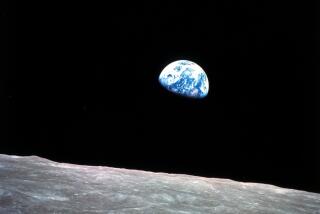The Early Bird Catches the Fame
- Share via
Almost everyone knows the first person to conquer Mt. Everest was the New Zealander Edmund Hillary. Not many know that the second person, Tenzing Norgay, a Sherpa guide from Nepal, reached the summit only seconds later.
Hillary was knighted by the queen of England and became a household name around the world for the 1953 feat. Norgay, considered the world’s most experienced climber at the time, is a postscript.
If anyone knew their names, history would be littered with also-rans like Norgay--the deserving but anonymous scientists, inventors, explorers, athletes and beauty queens who missed enduring fame and glory because they placed second in a competition or were second to accomplish a goal. Hardly anyone remembers who came second, even if it was only a matter of a split-second, a millimeter, a few votes or a twist of fate.
“When it comes to fame, fame all the other guys are a high school team and Neil [Armstrong] is the only guy in the NFL,” says Andrew Chaikin, author of “A Man on the Moon” (Penguin, 1998), quoting an anonymous moon walker. “It’s just a fact of the public’s preoccupation with firsts. Years from now, who’s going to remember Sammy Sosa”
This year, Chicago Cubs slugger Sosa might have made history by hitting 66 home runs, breaking Roger Maris’ 1961 record of 61. Unfortunately, Mark McGwire of the St. Louis Cardinals broke Maris’ record a few days earlier than Sosa did. McGwire went on to set a new record of 70, leaving Sosa face to face with the dustbin of history.
Encyclopedias have lengthy entries for Jackie Robinson, the first African American to play major league baseball, integrating the Brooklyn Dodgers in the National League in 1947. The books have no listing for the second black major league ballplayer, Larry Doby, hired a year later by the Cleveland Indians in the American League.
Richard Nixon observed the consequences for second-place finishers in his field: “Finishing second in the Olympics gets you silver. Finishing second in politics gets you oblivion.”
Why are we so obsessed with firsts? The sociological explanation is that winners reinforce the Western notion that “individuals do, in fact, make their own destiny,” says S. Craig Watkins, a sociologist at the University of Texas in Austin. “There’s something inspirational and motivational about the fact that someone was first, not that it was a team or collective effort.”
The practical explanation is that singling out the winners is the most efficient way for society to identify achievements. How could we possibly remember all the little, ordinary people thanked by the big, glamorous people on Oscar night?
The evolutionary explanation is that seeking the highest rank is a natural phenomenon peculiar to the male of the species.
“Levels of testosterone tend to go up in men when men win,” says Helen Fisher, an anthropologist at Rutgers University in New Brunswick, N.J. “When men watch a soccer game and their team wins, their levels of testosterone go up.”
Even those who try to portray their accomplishments as a group effort have run into resistance from others who insist on identifying and lionizing the individual who was first. Everest climbers Hillary and Norgay, for instance, initially resisted pressure by reporters to say who reached the summit first, according to Audrey Salkeld, a mountain historian who lives in Somerset, England. “The Nepalese thought if they were not saying, it was because Tenzing was first. There were a lot of ill feelings. The Asians all felt the Westerners were claiming credit. . . .
“Later on, when Tenzing wrote his book [‘Tiger of the Snows’], he said that ‘the highest mountain deserves the truth and Hillary stepped there just ahead of me.’ ”
Similarly, some turn-of-the-century Brazilians were upset when their countryman and aeronautical engineer Alberto Santos-Dumont was pushed out of the record books by Orville and Wilbur Wright. While the Wright brothers get credit for the first airplane flight, on Dec. 17, 1903, in Kitty Hawk, N.C., they did not publicly demonstrate their airplane until 1908. Santos-Dumont, working in Paris, flew an airplane he designed in November 1906.
“Many people in Brazil still claim Santos was the first to fly,” says Peter Jakab, curator in the aeronautics department at the Smithsonian Institution’s National Air and Space Museum. “It’s a national pride thing.”
Famous in his own way, Santos-Dumont went on to build other airplanes and dirigibles and is also known for a wristwatch specially designed for him by Jacques Cartier so that he could tell time while flying without having to check his pocket watch. Later, Santos-Dumont became a tragic figure, developing multiple sclerosis and becoming despondent over the use of airplanes for military purposes. He hanged himself in 1932.
Individuals Who Were So Close, Yet So Far
Perhaps the saddest story of a second-place finisher belongs to British explorer Robert Scott, who did not realize he was the second person to reach the South Pole until he arrived on Jan. 18, 1912, and learned that Roald Amundsen had been there a month before. According to Stephen Jay Gould, writing in the September issue of Natural History, Scott was confined to a tent by a blizzard, just 11 miles from his depot when he “froze to death, leaving a last journal entry that has never been matched in all the annals of British understatement--’It seems a pity, but I do not think I can write more.’ ”
The most famous second-place finisher, according to Gould, is 19th century scientist Alfred Russel Wallace, who came up with a theory of natural selection at the same time as Charles Darwin. Younger, poorer and obviously more naive, Wallace sent his theory in 1858 to Darwin, who hadn’t yet published his idea. In a panic that he wouldn’t be first, Darwin and his friends Charles Lyell and Joseph Hooker came up with a solution known as the “delicate arrangement.” That year, without consulting Wallace, Darwin presented Wallace’s paper as well as his own unpublished works to a professional society in London. As a result, Darwin established himself as the first author of the idea that has forever been linked with his name. Wallace never publicly complained, but it’s not easy for many to play second fiddle.
As the second man on the moon, Edwin E. “Buzz” Aldrin earned a reputation for having a complex about being second to Neil Armstrong, the commander of the Apollo 11 lunar mission and the first person to set foot on the moon in 1969.
In a new play called “King of the Moon,” the character of Aldrin says, “There are no parades for the second man on the moon.”
In fact, says Chaikin, Aldrin did get parades and his real feelings are profoundly mixed. “People have gone after him, me included, asking, ‘Didn’t you really want to be first?’
“A lot of guys perceived him as campaigning to be first. Buzz insists he was trying to do what was best for the mission and had misgivings about the attention that would come with being first.
“It was hard for him in the years after the landing to deal with the public attention and being introduced as the second man on the moon. He had an overbearing and demanding father who was apparently not happy about him being second.
“Today he has a very good feeling about what he accomplished and feels damn lucky to be on that first landing.”
In general, researchers say, it is more painful to come in second than third.
Thomas Gilovich, professor of psychology at Cornell University in Ithaca, N.Y., says, “The silver medalist compares with what might have been and it’s a close comparison upward. They think, ‘Boy, if I had done better, I’d be on the Wheaties box now.’ ”
Bronze medalists tend to compare down. They’re happy they made it to the medal stand, he says.
Some psychologists try to help second-placers adjust by seeing a silver lining: For instance, they don’t have as much to lose as the front-runners the next time.
Some people, however, never really get over being second.
In 1912, Abel Kiviat, a long-distance runner from New York who had set a world record for the 1,500-meter run, was favored in that race at the Olympic Games in Stockholm. Kiviat took the lead in the bell lap and was heading toward the finish with two teammates beside him when a racer from England passed them all. A.N.S. Jackson took first with a time of 3:56.8. Kiviat finished second with 3:56.9.
In 1990, Kiviat told The Times he had had nightmares about that race. Still, he said, “I remember it vividly.” He was 97.
More to Read
Go beyond the scoreboard
Get the latest on L.A.'s teams in the daily Sports Report newsletter.
You may occasionally receive promotional content from the Los Angeles Times.










